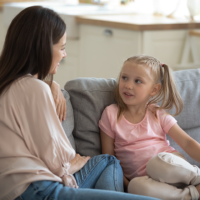Psychosis
-

DNA Methylation, Lateral Ventricular Volume, and Psychiatric Risk for Schizophrenia
In this Papers Podcast, Dr. Charlotte Cecil and Dr. Mannan Luo discusses their co-authored JCPP paper ‘DNA methylation at birth and lateral ventricular volume in childhood: a neuroimaging epigenetics study’.
Read more -

Adolescent psychotic experiences before and during the COVID-19 pandemic: a prospective cohort study
Paper from the JCPP – ‘The Tokyo Teen Cohort (TTC) is a prospective cohort study of adolescents in the general population of the Tokyo metropolitan area, followed from age 10 to 16 years. We used multi-level linear regression models to test the associations between the phase of the COVID-19 pandemic and self-reported PEs.’ Jordan DeVylder et al.
Read more -

Antipsychotic prescribing patterns in children and adolescents attending Australian general practice in 2011 and 2017
Open Access paper from JCPP Advances – ‘We aimed to examine patterns of paediatric antipsychotic prescribing in Australian primary care services in 2011 and 2017, including diagnoses, sociodemographic characteristics, off-label prescribing, and psychotropic co-prescribing.’ Julie Klau (pic) et al.
Read more -

Psychotic-like experiences and adverse life events in young people. Does gender matter?
Paper from the CAMH journal – ‘Psychotic-like experiences (PLEs) and adverse life events (ALEs) are highly prevalent in sub-Saharan Africa where gendered practices are also common. There is, however, a paucity of data on how the relationship between PLEs and life adversities is influenced by gender. The current study addressed this gap.’ Samuel Adjorlolo (pic) et al.
Read more -

Early manifestations of genetic liability for ADHD, autism and schizophrenia at ages 18 and 24 months
Open Access paper from JCPP Advances – “Given that ADHD, autism and schizophrenia are all highly heritable, we tested the hypothesis that in the general population, measures of toddler language development, motor development and temperament are associated with genetic liability to ADHD, autism and/or schizophrenia”. Lucy Riglin (pic) et al.
Read more -

Dr. Marinos Kyriakopoulos
Dr. Marinos Kyriakopoulos is a Consultant Child and Adolescent Psychiatrist at South London and Maudsley NHS Foundation Trust, Visiting Senior Lecturer in Child and Adolescent Psychiatry at the Institute of Psychiatry, Psychology and Neuroscience, KCL, and Honorary Consultant Child and Adolescent Psychiatrist at Great Ormond Street Hospital. He is Joint Training Programme Director for Child and Adolescent Psychiatry at the Maudsley Scheme. Dr. Kyriakopoulos is an Associate Editor of CAMH, focusing on Clinical Research Updates.
Read more -

Progressive cortical thinning might identify children at risk of developing psychotic spectrum symptoms
Offspring of patients with schizophrenia or bipolar disorder have an increased risk of developing these conditions. However, our capacity to predict the long-term outcomes of these at-risk individuals is limited. Now, researchers have investigated whether longitudinal changes in brain structure differ in individuals at high familial risk who develop psychotic spectrum symptoms, compared to those who do not and to low-risk controls.
Read more -

Dr. Helen Fisher
“It is an absolute honour to be joining the prestigious JCPP team as a specialist editor for psychosis. Psychotic phenomena are surprisingly common during childhood and adolescence and deserve greater research and clinical attention. I’m excited to have the opportunity to read and encourage submissions to JCPP on the aetiology, phenomenology, prevention, and treatment of psychosis during these key stages of development.”
Read more -

Can we prevent psychosis in high-risk adolescents?
Over the past two decades we’ve seen growing efforts to prevent psychosis developing in people with subtle signs and symptoms of the disorder, termed ‘Clinical High-Risk State for Psychosis’ (CHR-P).
Read more -

Voice-hearing can be positive for some young people
Researchers in Manchester have described the diverse forms and functions of voices heard by young people. Sarah Parry and Filippo Varese collected demographic, contextual and qualitative data from 68 adolescents (13-18 years old) from around the world who had direct experience of voice-hearing.
Read more